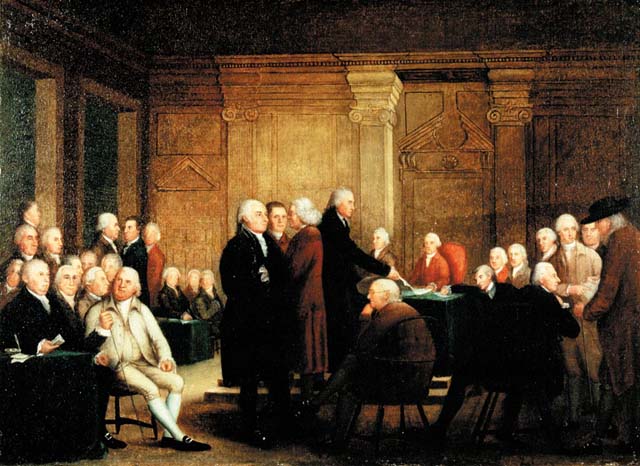Independence Day: the Redress of Grievances

Happy Independence Day! On July 4th, 1776, the Declaration of Independence was adopted by the Continental Congress. The opening lines of this document are among the most famous in the English language. Less well known is the list of grievances that form the basis for the document's declaration of independence from the British crown.
Reading through the 28 statements of grievance put forward in the Declaration today, one cannot help but be struck by how many of them apply to our contemporary political situation, in the struggle between the people of the United States and the two narrow party factions that monopolize political power at all levels of government. In the spirit of Independence, let's consider a few of these parallels and let the facts be submitted to a candid world.
The history of the present party system is a history of repeated injuries and usurpations.
The ruling factions have refused their assent to laws, the most wholesome and necessary to the public good.
They have prevented the passage of laws of immediate and pressing importance, unless suspended in their operation until their assent should be obtained, and when so suspended they have utterly neglected to attend to them.
They have called together legislative bodies at places and times unusual and uncomfortable, for the sole purpose of fatiguing the people into compliance with their measures.
They have called for, and succeeded in achieving, the dissolution of public assemblies and free associations of citizens who oppose their invasions on the rights of the people.
They have endeavored to prevent the population of these states, for that purpose obstructing the laws for the naturalization of foreigners, and refusing to pass others to encourage their migrations hither.
They have obstructed the administration of justice by refusing to approve judges to sit on the judicial bench.
They have erected a multitude of new executive offices, and sent hither swarms of officers to harass the people and eat out their substance.
They have affected to render the military independent of and superior to the civil power.
They have supported the stationing of large numbers of armed government agents among us, and protect them by a mock trial from punishment for any murders which they should commit on the inhabitants of these states.
They have manipulated the means of trade with all parts of the world.
They have abolished our most invaluable laws and altered fundamentally the form of our government.
They have abdicated government here by waging war against us.
They are at this time in full support of transporting large armies of domestic and foreign soldiers to complete the works of death, desolation and tyranny, already begun with circumstances of cruelty and perfidy scarcely paralleled in the most barbarous ages, and totally unworthy of a civilized nation.
They have excited domestic dissensions, and through their acts and policies have invited attacks on our soil from abroad.
In every stage of these oppressions, the people have petitioned for redress in the most humble terms. Repeated petitions have been answered only by repeated injury.
With that, we have identified fifteen parallels between the grievances listed in the Declaration of Independence and our political situation today. As for the rest, the reader can decide if they are still applicable today. Beyond that, we have yet to state any of the standing grievances against the present party system that are not encompassed by those in the Declaration.
When is enough, enough?




